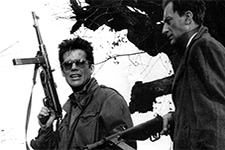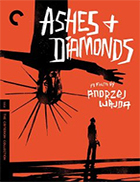Ashes and Diamonds (Popiól i diament)
|  Andrzej Wajda’s Ashes and Diamonds (Popiól i diament) was the third film in a loose, originally unintended trilogy about Poland during World War II, and it is a fitting capstone that solidified Wajda’s place in international cinema. Taken together, the three films, which also include A Generation (1955) and Kanal (1957), form an impressive vision of a country being torn apart from every direction by tragedy of a global scale. A Generation is an apt title for all three films, as they depict with particular clarity the effect of World War II on the generation of men and women who came of age during the 1940s. In fact, the young male protagonists of the first and third films, although not the same, can easily been seen as a single character in two vastly different stages of life. In A Generation, Tadeusz Lomnicki played Stach, a teenager who has his political consciousness raised and loses his innocence as he joins the underground fight against Poland’s Nazi occupiers. In Ashes and Diamonds, Zbigniew Cybulski (known as the “Polish James Dean” for both his good looks and his early death) plays Maciek, a young man in his early 20s who has been fighting with the Polish Home Army against the Nazis for so long that he has lost all sense of life except the pursuit to free Poland. The entirety of Ashes and Diamonds takes place on August 8, 1945, the day the Germans unconditionally surrendered to the Allies, but the fight for Poland is far from over. The Stalin-led Soviet Red Army is poised to take over the country, and the Polish Home Army must immediately turn its attention from the Nazis to the Soviets, their former allies. When the film opens, Maciek and his partner, Andrzej (Adam Pawlikowski), have orders to assassinate Szczuka (Waclaw Zastrzezynski), a local Communist Party secretary who has just returned from the Soviet Union. Unfortunately, they botch the job by killing the wrong man, which Wajda depicts in brutal fashion to underscore how the violence does not end with World War II, but simply changes faces, in this case from a global world war to a more intimate civil war. Maciek and Andrzej return to the Hotel Monopol in a nearby town, where they realize their mistake when Szczuka walks through the door. This is depicted in a brilliantly staged, Wellesian deep focus shot with Andrzej in the foreground calling his superior to inform him of the “successful” assassination, Maciek in the middle ground lounging against a bar, and Szczuka entering the hotel in the background, completely unaware that the two men in front of him have orders to kill him. Thus, Maciek and Andrzej must bide their time until they find a good opportunity to finish the job. Meanwhile, a political banquet is being held at the hotel, which is filled with petty bureaucrats and schemers who are all jockeying for a good position in the new Poland. Wajda effectively employs this banquet as an opportunity to critique the speed with which power-hungry jackals attempted to fill the political vacuum left by the end of the war, something he never could have done before the post-Stalin political thaw that began in 1956. The heart of the film, though, is in the relationship Maciek strikes up with a beautiful barmaid named Krystyna (Ewa Krzyzewska). Because Wajda and coscreenwriter Jerzy Andrzejewski have condensed the events of Andrzejewski’s source novel into a single day, the relationship feels a bit forced, but it works nonetheless because the actors are so naked in their emotions. With all the turmoil in the air—fears of the future mixed with the elation following the end of a long war—it is understandable that Maciek and Krystyna would find solace in each other’s arms, even if they are strangers. They share the common bond of both being alone in the world, and together they discover a kind of love both had suppressed during the war. This is a particularly relevant event for Maciek, who suddenly realizes that his devotion to the cause of Polish freedom comes at the cost of his own life—not physically (although it might come to that), but emotionally. Maciek is a product of the era in which the film was made, with his dark glasses, contemporary clothes, and casual cool making him look as though he just walked out of an angsty French New Wave film. Yet, he is not as emotionally distant as his appearance would suggest; in fact, Maciek becomes an effectively tragic figure. Even the cool sunglasses have a tragic purpose: to shield his damaged eyes, which have become overly sensitive to light because he has spent so much of the war lurking in dark sewer tunnels during the Warsaw Uprising (the subject of Wajda’s Kanal, whose Dantesque imagery forever haunts those who see it). Having given himself over to the Home Army, Maciek is duty-bound to carry out the assassination of Szczuka, after which he will have to go underground. Thus, his heart is torn in two directions, as he must decide whether to sacrifice his newfound love for Krystyna in order to carry out his patriotic duty or follow his romantic longings and turn his back on his country and be labeled a deserter. In this sense, Ashes and Diamonds is about the oldest subject in the dramatic canon: love, pure and simple. Wajda is first and foremost a humanist, but there is cold, dark irony in the film, which rears its bitter head in the final scene, where the film’s existential questions are left literall stranded on the top of a trash pile. Again working with cinematographer Jerzy Wojcik, who also shot Kanal, Wajda tells the story in bold visual terms; Ashes and Diamonds was a true moment of maturation for the filmmaker. His use of long takes, deep focus, and expressionistic lighting borrows from numerous sources, both American and European, but it all coalesces into a style that is uniquely and fully Wajda’s.
Copyright © 2021 James Kendrick Thoughts? E-mail James Kendrick All images copyright © The Criterion Collection | |||||||||||||||||||||||||||||
Overall Rating: 


 (3.5)
(3.5)


